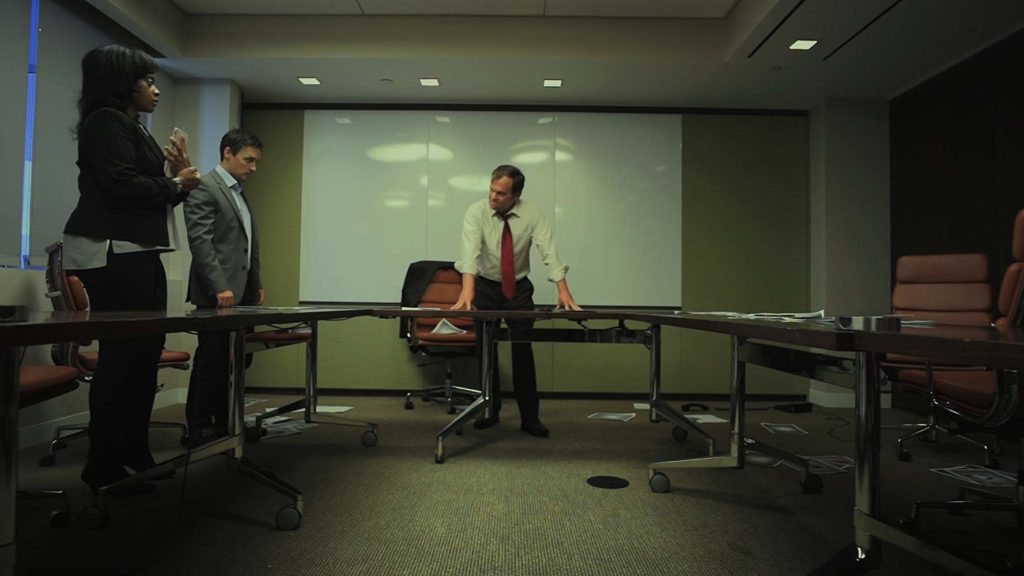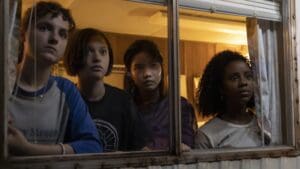Summary
Broken Ceiling is a claustrophobic, almost theatrical film about power struggles in the office environment. Written and directed by Adam Davis, and available on Amazon Prime.
Broken Ceiling sees four people in a media sales department getting together for an important conference call. They each bring skills and knowledge to that meeting, and privately they each bring their own agendas too. Consequently, the conference room soon becomes the setting of a power struggle, exposing issues of sexism, racism, the arrogance of management and good old toxic office politics.
The film is set almost entirely within the office complex; indeed three-quarters of it is purely in one room, with other small scenes taking place in nearby rooms (such as the restroom) and brief flashbacks. I’ve seen other films in such a setting before (such as Nightmare Code and The Belko Experiment), and indeed my day job is in an office, so I’m very familiar with it; but in Broken Ceiling, the characters do not leave the building once, giving it a very claustrophobic feel.
We only meet four main characters: Ken Wolfe (Regen Wilson), the senior manager whose career, reputation and indeed department are at stake; Angela Walker (Karan Kendrick), his long-suffering assistant; Tyler Foster (Rane Jameson), the young and ambitious salesman; and Garrett Jensen (Torran Kitts), the newbie who is being groomed to replace Foster. Actually, there is one other key character: the man at the end of the phone, Mr. Bradshaw (Jay Disney), the client, who no-one present has actually met. And I must say these characters are the real strength of Broken Ceiling: they are believable through and through. I’m sure I’ve met all of them, I’ve worked for someone like Wolfe and I work with men quite like Foster and Jensen. The film is about how all of these characters play against each other, though the pivotal one is Walker.
Angela Walker is the only woman in a room of men (and indeed that includes the client on the phone); more specifically, the only black woman in a room of white men. As Wolfe’s assistant, her role is peripheral to start off with, though clearly important: she wouldn’t have stayed in that role for ten years otherwise. Gradually, we get to know each of the characters’ interests in the meeting… and I don’t think I’m spoiling anything when I say that a moment comes when the central nature of Walker’s role becomes very clear. Her character is written to encapsulate many women’s experience of careers (“I do an amazing job so I would get promoted, not so you would pigeonhole me”), and the way she stays on the sideline until she simply cannot any longer is mirrored very well in the production: the meeting is all about the men, the company is all about the men, and it’s clearly going to stay that way until she does something. The ethnic element to her role does not form a part of the plot, but rather adds an extra layer to the modesty that she grew up with and brought with her into her job; specifically, adds some fitting in effort similar to the principal character in The Hate U Give, a film where I’d seen Kendrick before (though in a smaller and much less subtle role).

But although the characters are very well written, there’s a bit of an issue with the overall writing in Broken Ceiling: it’s not clear what Walker is trying to achieve when she takes control of the meeting, and therefore it’s not clear if she succeeds. You could say she teaches them all a lesson or two, rather than actually breaking through the glass ceiling; but that doesn’t resolve the career trap she’s in. She teaches the men some lessons about their behavior, sure; but the lessons are not so much about how wrong their behavior is, but that they could be exposed. The film closed with me wondering what she was really hoping to achieve, and how healthy it is to show an audience that Walker’s position as a BME woman in an office career is a futile one. Personally, I think the view of office life that the film shows us is somewhat dated: no doubt there are still some teams like this, but I would like to think they are on their way out.
The film’s production is sharp yet simple: Broken Ceiling would work very well as a stage play. There are no close-ups, fancy cinematography or special effects that would rule that out. The sound isn’t brilliant; a little echoey at times… but the staff have come into work on a Sunday especially for this meeting, so I guess it just reflects how empty the rest of the building is, which adds to the tension. (Interestingly, Adam Davis, the film’s director, has written about how he was able to use the limited location to his advantage; good insight for other filmmakers.)
And yes, regardless of its flaws, Broken Ceiling is certainly tense. Davis both wrote and directed the film, and although I think a better job was done with the direction (his first feature as a director) the two hang together very well. The occasional tangents come in at just the right moment, moving the focus to each team member one by one, and although there are times when I expect any one of them could “go postal”, very little of the film turned out as I expected. Specifically, there was one sudden change of style which could have felt clumsy but was actually satisfying.
Overall, I really did enjoy Broken Ceiling. Angela Walker was a character to admire, and the others were much more well-rounded than they first appeared. The story was gripping and the ending thought-provoking: maybe sometimes you need to take control for a while, even if the outcome is unknown.



